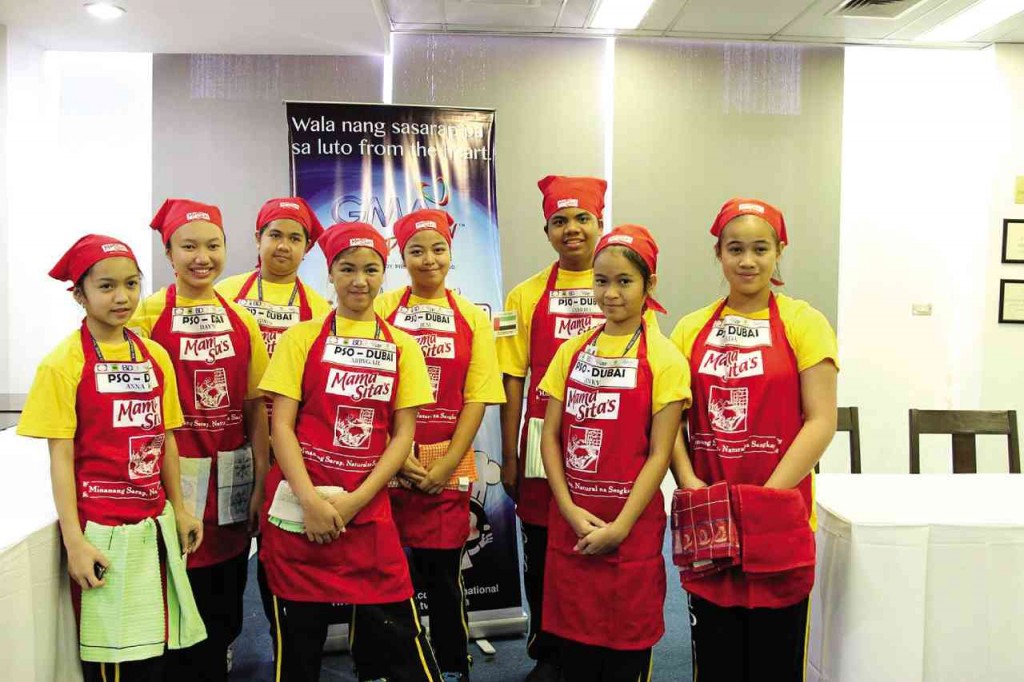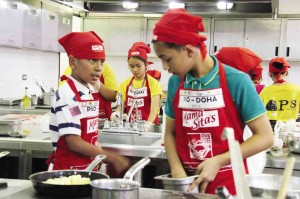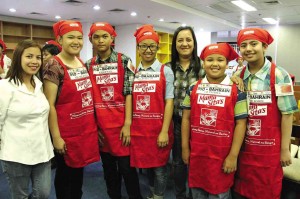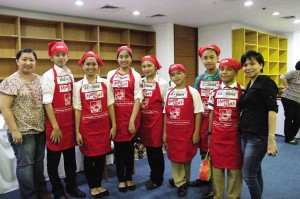Team PH-Dubai kids win cookfest
On May 1, Labor Day, 30 pre-teen and teen-aged students from Philippine Schools Overseas (PSO) in Bahrain, Oman, Doha, Dubai, and Shanghai converged in the kitchens of Enderun Colleges in McKinley Hill, Taguig to face-off and demonstrate culinary skills inspired by their Filipino heritage.
Most of the student-contestants are children of overseas Filipino workers.
The 1st Philippine Schools Overseas (PSO) Culinary Competition 2013-14 was conceptualized by the Commission on Filipinos Overseas (CFO) to foster cultural connectivity. The project was supported by the Mama Sita Foundation together with Banco de Oro, Landbank of the Philippines, the Department of Agriculture, and GMA 7-International.
According to Undersecretary Mary Grace Ampil-Tirona, executive director of the CFO, the primary objective of the project is to continuously strengthen the cultural ties of children of overseas Filipinos with the home country and to raise awareness of the vocational, technical and entrepreneurial tracks being opened under the government’s K-12 curricular reform program.
The culinary competition focused on the development of youthful appreciation for national dishes, not just by eating them with gusto, but by learning how to cook a range of favorite Philippine signature dishes from “scratch.” Blurring traditional gender roles, the competition drew both male and female contestants.
After a year of classroom practice under their mentors and coaches and the submission of well-documented on-campus elimination rounds simulating a food festival, five out of the 41 PSOs operating in the Middle East, Libya, Greece, China, and Timor Leste sent their high school and grade school teams for the balikbayan finals. (The 6th team—PSO Kuwait—withdrew due to delayed travel documents.)
Filipino dishes
Anxious parents, mentors and friends watched the whole procedure from food preparation to cooking to plating and deliberation by the board of judges. Nervous excitement in the viewing room was evident as the TV monitors focused on every move of the contestants. On the other hand, the students appeared cool, calm and collected as they peeled potatoes, minced garlic, flattened chicken meat, poured lumpia wrapper batter, carved pumpkins like pros, fried and baked the dishes.
The roving judges were: Bistro 1771 Chef Vicky Rose Pacheco, Inquirer columnist Norma Chikiamco, Appetite magazine editor Nina Daza Puyat, Manila Bulletin journalist Zac Sarian, adobo festival convenor Lyn Gamboa, and Mama Sita’s Mark Lapus. They tasted nine different viands within one hour and prepared in two modes—from “scratch” and another using instant Mama Sita products.
Dishes included Adobo con Kalabasa (High School-Shanghai); Pinoy Paella (HS-Bahrain); Chicken Roll w/ Mommy’s Sauce (Grade School-Bahrain); Pastel de Pollo (HS-Oman); Stir Fried Chicken & Shrimp with vegetables and Chicken-Apple Curry (GS-Oman); Fresh Lumpia (HS-Doha); Adobong Manok (GS-Doha); Adobo Lumpia with Icey Vinegar (HS-Dubai); and Grilled Pork with Tuna Ceviche (GS-Dubai).
The unique feature of the competition? No losers, all winners—since all teams already bested their schoolmates in their respective host countries.
And the winners are…
It was PSO Dubai’s night.
The combined scores of both HS and GS teams won for them the top prize of $500. They also received another $200 as the top high school team and and another $200 as the top grade school team.
The next in rank: PSO Bahrain-$400, PSO Doha-$300, PSO Oman-$200, PSO Shanghai-$200. Additional rewards from the CFO included a whole library collection on Filipino
cuisine, international recipes and technical references for each PSO; handsome coffee table books for the mentors; and illustrated cookbooks for the students. Chef Vicky Rose Pacheco shared helpful tips on sanitation, food handling and waste segregation as a bonus from a pro.
The age-range of the competing male and female teamsters, from 8 to 16 years old, has proven that our OFWs’ youngsters already think big, said Ampil-Tirona. The future is open to them—as environmental-friendly agriculturists and food scientists, chefs, restaurateurs, TV food show talents, producers and journalists, as well as food exporters and retailers.





